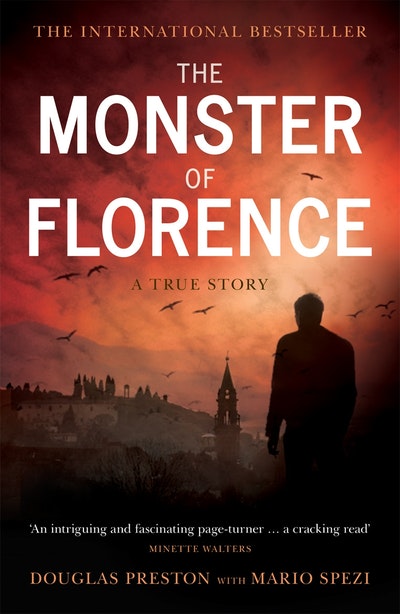The Monster of Florence
- Published: 1 July 2010
- ISBN: 9780753520673
- Imprint: Virgin Digital
- Format: EBook
- Pages: 448
An intriguing and fascinating page-turner ... with as many twists as a novel ... Tuscany is as vividly drawn as the people who inhabit its landscape ... a cracking read
Minette Walters
The fascinating story unfolds with memorable characters and dizzying plot twists that could come off as far-fetched if the book was fictional ... the two collaborators skillfully weave the narratives back and forth to create, at times, a razor's edge of tension
Associated Press
Lucid and mesmerising
TIME
The authors have brilliantly mapped out the dark, labyrinthine story of his crimes
Men's Vogue
A meticulous account
Kirkus
The co-authors expertly and entertainingly guide the reader through an epic, colorful cast of characters and the stranger-than-fiction machinations of a Byzantine Italian judicial system
Washington Post
Preston knows how to load his storytelling with intriguing evidence and damning details. His feverish style keeps the reader turning with the hope of uncovering the killer's identity
USA Today
The only thing that stops it being a perfect crime novel is that there's no resolution ... Various investigators, journalists, protagonists and novelists ... have all tried to capture the hypnotic horror of the Monster in the past. But this new book is one of the best I have read. The combination of Spezi's expertise with Preston's narrative skills and his outsider's clarity of vision makes it both detailed and clear. They perfectly evoke the contrast between the gruesome crimes and the sublime backdrop ... a gripping read
Tobias Jones, The Observer
This is a book that anybody who enjoys crime and horror stories should read
Book of the Week, Evening Standard
A rigorous study of a case that gripped the Italian media. Part thriller, part police-procedural, it is ultimately the incompetence of the Italian police, rather than the violence of the killer himself, which terrifies the reader
Financial Times
Their gripping story gives a deeper insight into the murky workings of Italian justice than any book in English for some time
The Independent
It would appear that the Italian law-enforcement agencies are every bit as corrupt and inept as most crime novels set in Italy suggest they are ... a rattling good story. Preston has arranged his material with skill and presents a great deal of complicated information lucidly and with good pace
Daily Telegraph
Preston tells the story from the start, in classic thriller style: 60 short chapters, each with an effective twist ... The resulting book is intensely readable and sometimes moving, particularly when Preston, post-9/11, confronts the fact that evil is by its nature incomprehensible
Irish Times
The tone changes from the patient objectivity of true crime to the paranoia and frustration of a travel narrative in which Preston finds himself enmeshed in an alien culture whose obscure bureaucracy he can't hope to fathom. This makes for compulsive reading ... It is this dual register that makes The Monster of Florence so surprisingly original a read
The Sunday Times
A gripping read
Julian Clary, The Times
The first part of the book is a full account of the murders ... but the second part is equally alarming as Preston recounts the authorities' odd attempts to find the identity of the Monster of Florence, led by accusations made by a clairvoyant. This is a page-turner with relevance to the current trial of Amanda Knox, as said clairvoyant has claimed a link between the cases
Metro
There is a small and specialised club of crime writers who use talents honed in fiction to try to solve real murders ... thriller writer Douglas Preston joins their clique ... The underlying theme of an American innocent visiting a beautiful country that turns out to be an Old European cesspit of murder and corruption is ideal for Hollywood: Tom Cruise is already being linked with the role of Preston. But don't let that put you off
Time Out
A lively, extremely readable account of the tortuous threads of the twenty-five-year investigations, and more particularly the authors' own involvement in it. With its shenanigans and convolutions, the story might more properly belong in the realm of comic opera, were it not for the profoundly disturbing light it sheds on Italian justice, and the fact that it chronicles, in careful detail, the way senior policemen and lawyers made careers out of pursuing lines that they knew to be false, while ignoring those that proved to be valuable
Caroline Moorehead, Times Literary Supplement


